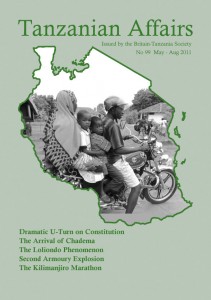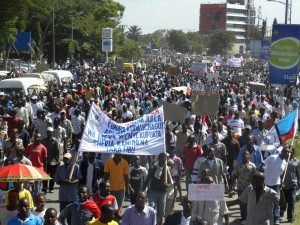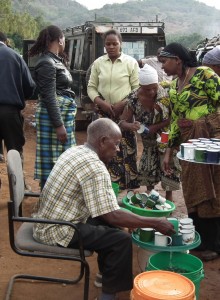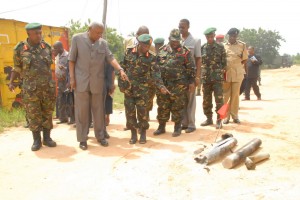Compiled by Valerie Leach
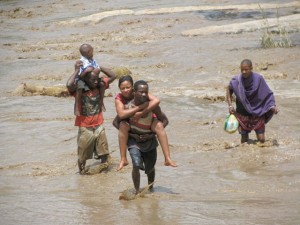
Porters on the Mjonga River - photo John Nditi
An unidentified porter helps Mwnahawa Rashidi, a resident of Malowa Village, Kibati Ward in Mvomero District to cross a section of Mjonga River whose bridge was recently washed away by floods. The porters charge their ‘passengers’ 1,000/- for a ride on the back and 500/- for those who prefer a helping hand. Children and the sick are given a free ride – Daily News
Prices
Prices continue to rise at a higher rate than the Bank of Tanzania’s target rate of 5% in MKUKUTA II, the latest version of the Government’s growth and poverty reduction strategy. Moreover, poor households, who spend a larger proportion of their income on food than better off households, continue to be disproportionately affected by high food prices. Overall prices increased on average from 4.4% in the period 2002 to 2005 to 9.5% on average from 2006 to 2010. Food prices in the same periods rose from an average of 6.5% per annum from 2002 to 2005 to 10.6% on average from 2006 to 2010. The increase in local prices has been attributed to insufficient rainfall and international prices. – National Bureau of Statistics and Bank of Tanzania
Government Budget
The Government budget for fiscal year 2010/2011 was an ambitious one, increasing from TShs 9.5 trillion in 2009/10 to TShs 11.6 trillion. Reaching the revenue targets of this budget has been challenging. By January 2011, tax revenue collection was just over 90 percent of the budgeted revenue, and the shortfall in project grants was even larger at 71 percent, leading to an equivalent shortfall in development expenditure. There will be further pressure on revenue collections if the current power shortages continue and consequently industries and businesses cut their operations. TRA Director of Research and Policy, Mr Tonedeus Muganyizi told members of the Parliamentary Committee for Energy and Minerals in Dar es Salaam that the deficit in collection during the second half of the financial year may be as much as 30 percent. Strategies for dealing with the power shortages have been proposed: settling the Dowans dispute and providing fuel to run the IPTL generators. Recent rainfall in catchment areas of the large hydro systems have helped somewhat to alleviate the problem.
The budget for 2011/2012 incorporates a very modest increase to TShs 11.9 trillion. (The current rate of exchange is approximately £1=TShs 2,500.) Minister for Finance and Economic Affairs Mustafa Mkulo, announced a similar set of priorities for spending as in previous years: education, agriculture, energy, transport and communication infrastructure and development of industries, health, water, land and human settlements development, human resources development, science and technology, finance services development as well as crosscutting issues such as environmental protection. – Bank of Tanzania and Citizen
IMF Projects Brief Slowdown, Quick Recovery in Tanzania
A mission from the African Department of the International Monetary Fund (IMF) visited Tanzania during March 4-16, 2011. The IMF estimates that GDP growth in 2010 was 7 percent, and exports grew – manufacturing exports nearly doubled in the year. Projections for 2011 suggest a slower growth of 6 percent because of power shortages. With investment in additional electricity generation, the economy should bounce back, so that by the end of 2011, the rate of growth is expected to be 7 percent.
The IMF warned that achieving this rate of growth “will require careful control of expenditure commitments to keep them in line with available resources. The budget for the 2011/12 fiscal year (July to June) should begin the process of reigning in the fiscal deficit. Given the significant and legitimate spending needs—in areas such as health, education, and infrastructure—this will require a careful re-prioritization of expenditures, eliminating or reducing low priority spending, as well as measures to increase tax revenues.” – IMF Press Release No. 11/92
Mining
Gold continues to dominate export earnings, accounting for 40% of export earnings in the period July 2010 to January 2011. Mining is much more capital-intensive than it is labour-intensive, but Mr Greg Hawkins, chief executive, African Barrick Gold, said “The important thing for us is local employment – 89 per cent of our on the ground employees are local … Slowly but surely we’re starting to create an economy in the remote areas we operate in … We bring power and water to those communities … those are the two big things.” – Citizen
Coal – Expected growth in mining over the next few years will be significantly boosted by coal mining. According to the Tanzania Mining Report, “Coal is set to become one of the fastest-growing mining subsectors in Tanzania over the coming years, as the country looks to coalfired power stations to offset an energy shortage that is holding back its development.” – Citizen and Business Monitor International Ltd, Tanzania Mining Report Q2 2011
Uranium – Construction of the uranium mining plant for the Mkuju River Project in southern Tanzania will start in the first quarter of 2011 with operations beginning in the fourth quarter of 2013. Minister for Energy and Minerals, William Ngeleja, told The EastAfrican that the pre-feasibility study in March 2010 indicated that, once developed, the mine would produce 1,650 tonnes of uranium oxide a year, to become the eighth largest producer in the world. This will be the first major mining development in south eastern Tanzania. – East African
Rare Earth – Montero Mining and Exploration (listed in Canada) exploring rare earth deposits at Wigu Hill, could start production” quickly” because of the “high-grade, simple mineralogy” and “its close proximity to a major railway siding and the port of Dar es Salaam” – Business Times
Agriculture
Former United Nations (UN) Secretary General Kofi Annan has commended the Kilimo Kwanza initiative and expressed confidence in the potential of Tanzania’s agricultural sector. However, Mr Annan said after a three-day visit to Mbeya that much still needed to be done to make the dream of liberalising agriculture a reality. “I think Tanzania should copy what some other countries, like India, do. They ensure that small-scale farmers are serviced properly, something that makes it easy for them to acquire loans… the country should also increase investments in new agricultural technologies which will benefit smallholder farmers,” he suggested. – Citizen
China-aided agriculture centre in Tanzania
The Demonstration Centre aided by the Chinese government at Dakawa in Morogoro region has been handed over. President Kikwete praised China’s assistance to Tanzania, saying that this project will be another boost to agricultural development in Tanzania. The centre will focus on research and training for local farmers to learn Chinese agricultural technology, such as advanced seed technology to achieve high yields. Under the operation of Chongqing Sino-Tanzania Agriculture Development Company, the project covers an area of 62 ha – Guardian
Telecommunications
The fast spread of mobile telephones in Tanzania is being followed by efforts by telecommunications companies to boost internet connections. One company, Zantel, recently announced a cut in the prices for its modems by about 50 per cent, from TSh 49,900 to TSh 25,000. The company has also doubled the volumes on selected bundles on its ‘Z-Connect’ internet service, without changing the price. “Our aim is to ensure that more people own personal internet modems to increase internet penetration,” Zantel’s acting marketing director, Mr Brian Karokola said in the statement. The fibre-optic Eastern Africa Submarine Cable System (EASSy) is now operational and provides improved and faster internet connectivity. – Citizen
Petty Traders in Dar es Salaam
One morning early in March, petty traders operating in the secondhand clothes market in Manzese found their stalls demolished in an exercise of Kinondoni municipal authorities with the support of the municipal auxiliary police. The traders had not been warned or notified of the pending demolition. Several people were reported to have been injured when the police used live ammunition and tear gas canisters to disperse petty traders who were protesting against the demolition exercise, blocking Morogoro road to express their grievances. The Kinondoni municipal council said the area needed to be cleared for the construction of infrastructure needed for the Dar es Salaam Rapid Transit (Dart) project.
However, on March 24, the Mayor of Kinondoni Municipality, Mr Yusuph Mwenda, told The Citizen on Sunday that they had allowed the traders to continue using the market temporarily, while talks were underway on where to relocate them. The municipal communication officer, Mr Sebastian Mhowera said that the municipality had sought advice from Tanzania Roads Agency (Tanroads) and Dart on the possibility of allowing the traders to continue with their businesses. In order to conduct their business the traders had taken out loans from CRDB, micro credit institutions or savings and loans associations, loans which had to be serviced, despite the damage to their business. – Citizen
Valerie Leach lived in Tanzania from 1994 to 2007. Initially recruited to work with UNICEF in monitoring, evaluation and social policy, she went on to be a policy analyst with REPOA, an independent Tanzanian research institution based in Dar es Salaam. She returned to UK in 2007, together with her adopted Tanzanian children, Francis and Rose, where she continues to contribute to REPOA’s work.
